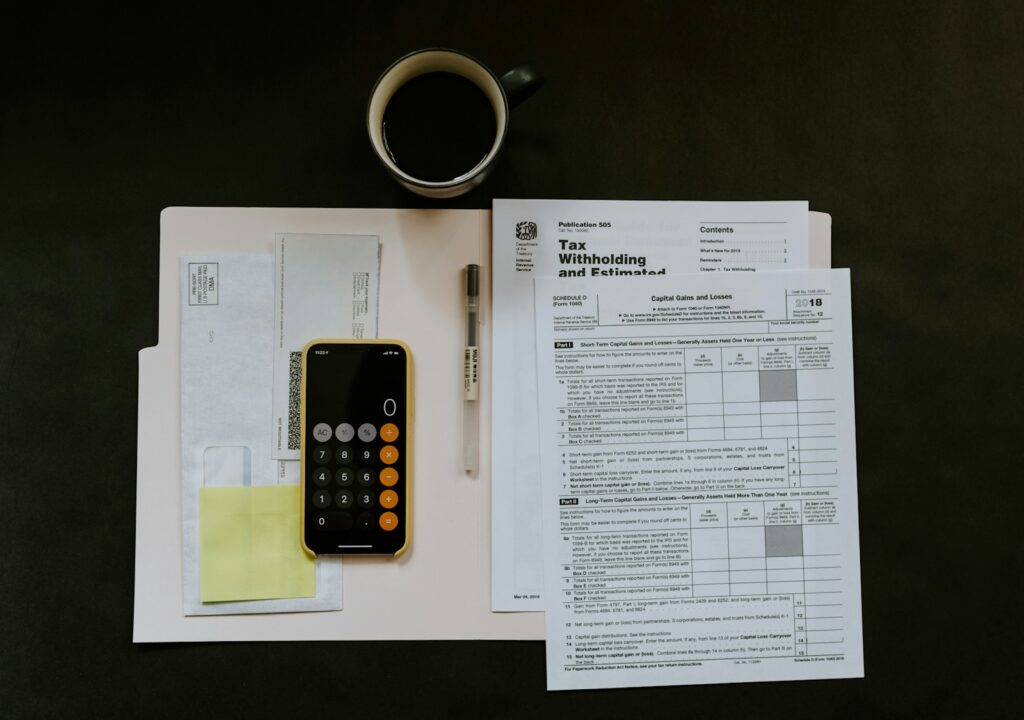Property management can simplify the rental process, but it does come with associated fees. For landlords in the UK, understanding whether property management fees are tax deductible is crucial to optimising their finances. This article explains how property management fees can be deducted for tax purposes and explores the tax benefits and deductions available for rental property owners.
Understanding Property Management Fees
Property management fees cover services provided by a property management company. For landlords, these services might include finding tenants, collecting rent, handling maintenance and repairs, and ensuring compliance with regulations. Fees are typically charged as a percentage of the rental income or as a flat fee, and rates vary depending on the services offered.
Property management is a popular choice among landlords who wish to make their rental properties more passive and hands-off. However, these fees do reduce rental income, leading many landlords to ask whether these expenses are tax deductible.
Are Property Management Fees Tax Deductible in the UK?
The short answer is yes—property management fees are typically tax deductible for UK landlords. HMRC allows landlords to deduct certain expenses from their rental income when calculating taxable profit. Since property management fees are an expense directly related to the rental business, they fall under allowable expenses.
HMRC’s Rules on Allowable Expenses
Allowable expenses are costs incurred “wholly and exclusively” for the rental business, meaning they should be essential to running and maintaining the rental property. HMRC guidelines specify that these expenses must not be capital in nature (i.e., adding to the property’s value over the long term, such as renovations) to qualify as deductible.
Since property management fees help landlords operate and maintain the rental property, they generally meet the criteria for allowable expenses. Landlords can therefore deduct these fees from their gross rental income, potentially reducing their tax liability.
How to Claim Tax Relief on Property Management Fees
Claiming tax relief on property management fees is straightforward. Here’s an overview of the steps involved in the process:
1. Keep Accurate Records
Landlords should maintain clear and organised records of all property management expenses. This includes invoices from the property management company, receipts, and statements. Keeping these documents will support your tax relief claims and provide necessary evidence in case of an HMRC enquiry.
2. Include Fees in Your Self-Assessment Tax Return
Most landlords in the UK submit a Self-Assessment tax return each year. Property management fees can be listed as an expense on the form, under “Property expenses.” By deducting these fees from the total rental income, landlords can calculate their adjusted profit, which will determine their tax liability.
3. Follow HMRC’s Property Income Manual Guidelines
To ensure compliance, landlords can refer to HMRC’s Property Income Manual, which outlines allowable and disallowable expenses. Following these guidelines will help landlords correctly calculate tax-deductible expenses and understand HMRC’s expectations regarding expense records and documentation.
Other Tax-Deductible Expenses for Landlords
Property management fees are just one type of expense that can be deducted from rental income. Other expenses landlords can claim as deductions include:
- Repairs and Maintenance: Costs for necessary repairs, such as fixing broken appliances or repainting walls, are deductible as long as they don’t significantly add to the property’s value.
- Mortgage Interest Relief: Though mortgage interest tax relief has been phased out, landlords can still receive a 20% tax credit on mortgage interest payments under the mortgage interest relief restriction.
- Utilities and Council Tax: If the landlord covers utilities or council tax, these can be deductible expenses.
- Insurance Premiums: Landlord insurance, which may cover buildings, contents, and liability, is deductible.
- Legal and Professional Fees: Costs for legal services, lease agreements, and accountancy services are also allowable expenses, as long as they relate directly to the rental property.
How Much Can You Save by Deducting Property Management Fees?
The amount landlords can save by deducting property management fees depends on their taxable income. By deducting these expenses, landlords lower their total profit and, consequently, their tax bill. For example, if a landlord falls into the 20% income tax bracket and has £1,000 in property management fees, they would save £200 in taxes by claiming these fees as a deductible expense.
Example Calculation
Imagine a landlord receives £15,000 in rental income and pays £1,500 in property management fees. Without deductions, they would pay income tax on the full £15,000. However, after deducting the £1,500, they only pay tax on £13,500, reducing their taxable income and overall tax bill.
What Property Management Fees Cannot Be Deducted?
While most property management fees are deductible, some expenses may not qualify. For example:
- Fees Related to Buying or Selling Property: Costs associated with purchasing a property or transferring ownership cannot be deducted, as they are capital expenses.
- Refurbishments and Major Improvements: Large projects that add to the property’s value—such as installing a new kitchen or extension—are classified as capital improvements, so they cannot be deducted as expenses. These may be used to reduce Capital Gains Tax instead.
Capital Gains Tax Considerations
Landlords must also be aware of Capital Gains Tax (CGT) if they decide to sell their property. While day-to-day property management fees are tax deductible, they do not impact CGT calculations. However, any major capital improvements made during the ownership period can help reduce CGT, as they increase the property’s base cost.
For example, if a landlord spent £5,000 on a new roof, this would count as a capital improvement and could be deducted from the property’s gain when calculating CGT. On the other hand, routine property management fees have no effect on CGT since they do not increase the value of the property itself.
Working with Property Management Companies to Maximise Tax Efficiency
A professional property management company can simplify tax matters for landlords by keeping track of allowable expenses and providing detailed statements for each service. Some companies also work with accountants to ensure that landlords are claiming all possible deductions.
By working with a property management company that provides transparent records, landlords can save time and avoid missing out on tax-saving opportunities. A reliable property management partner can also offer guidance on regulatory changes and help ensure that property income remains compliant with the latest HMRC rules.
Benefits of Using Property Management Services for Tax Efficiency
For landlords, partnering with a property management company can be a valuable strategy for maintaining tax efficiency and enhancing profitability. Let’s explore some of the specific ways in which professional property management helps landlords optimise their taxes:
1. Comprehensive Financial Reporting
Professional property management companies typically provide monthly or quarterly financial statements summarising all expenses and income associated with the property. This transparency not only simplifies tax reporting but also helps landlords monitor expenses, anticipate upcoming costs, and avoid unexpected financial surprises.
Some companies also offer end-of-year statements that consolidate all transactions in a single report, making it easier to complete tax returns accurately. This kind of record-keeping can reduce stress and help landlords avoid penalties or issues that might arise from incomplete financial reporting.
2. Staying Updated with HMRC Regulations
The tax landscape for landlords can change from year to year, especially with frequent government updates to property tax rules. Property management companies often work closely with tax specialists and accountants, allowing them to stay on top of the latest HMRC regulations and tax relief options. This knowledge can be crucial for landlords seeking to avoid tax errors and maximise their deductions.
For example, changes to mortgage interest tax relief affected many landlords, but property management companies that kept informed could guide their clients through the transition smoothly.
3. Identifying Additional Deductions
Many landlords may overlook some of the allowable expenses related to property management, particularly those who are new to renting out properties. A property management company can help ensure that all allowable deductions are claimed, including less obvious costs like landlord insurance, utility expenses covered on behalf of tenants, or fees for safety inspections.
4. Simplified Maintenance and Repair Tracking
Maintenance and repairs can be complex to track for tax purposes, as only certain repairs qualify as deductible expenses. Property management companies can simplify this process by documenting all repair costs and categorising them appropriately, distinguishing between capital improvements and allowable maintenance expenses. This categorisation helps landlords maintain accurate tax records and avoid claiming ineligible deductions.
How SmartSpace Helps Landlords Optimise Tax Benefits
For landlords working with SmartSpace, tax efficiency is built into the company’s services. Here’s how SmartSpace can help streamline tax management for its clients:
Detailed Monthly and Annual Statements
SmartSpace provides clients with detailed monthly and annual statements of all rental income and management-related expenses. These statements clearly list costs such as property management fees, maintenance charges, and any repairs made on the landlord’s behalf. This transparency simplifies the tax preparation process and ensures landlords have all the information needed to claim deductions accurately.
Assistance with Legal and Safety Compliance
SmartSpace manages essential compliance requirements, including gas safety checks, electrical safety inspections, and Energy Performance Certificates (EPCs). Since these expenses can also be tax deductible, SmartSpace’s handling of compliance allows landlords to claim these deductions with minimal effort. By ensuring the property remains compliant with legal standards, landlords can also avoid fines and potential legal issues that could impact their profitability.
Access to Tax Professionals and Accountants
In addition to managing property operations, SmartSpace partners with tax professionals and accountants who specialise in landlord tax planning. This means landlords receive guidance on maximising allowable deductions, staying compliant with evolving tax laws, and preparing for more complex tax considerations, such as Capital Gains Tax. Access to expert advice can save landlords both time and money by ensuring accurate, compliant, and tax-efficient filings.
Legal Considerations for Property Management and Tax Deductions
While property management companies can support tax efficiency, landlords should also consider the broader legal implications of rental income, property ownership, and tax reporting. Here are a few legal areas that landlords should keep in mind:
Compliance with Tenant Protection and Safety Regulations
Landlords are legally obligated to provide tenants with safe, habitable living conditions. This includes requirements like fire safety measures, gas safety checks, and routine maintenance of essential systems. Compliance expenses, such as those incurred for inspections and certifications, are typically tax deductible. Failing to meet these obligations could lead to fines, making it essential for landlords to stay up-to-date with legal standards.
Records Retention and HMRC Inspections
HMRC requires landlords to keep records of their rental income and expenses for at least five years after the 31 January submission deadline of the relevant tax year. If HMRC chooses to investigate a landlord’s tax records, having detailed records can be essential for defending the accuracy of tax returns and avoiding potential penalties. Working with a property management company can help landlords maintain proper documentation, as these companies often provide easily accessible records of all transactions.
Limited Companies and Property Management Fees
Many landlords have chosen to set up limited companies for their property holdings in recent years, largely due to changes in tax relief on mortgage interest. For those who operate their property business as a limited company, property management fees are still deductible, but the tax treatment may differ slightly. In these cases, landlords should work closely with both their property manager and an accountant to ensure they’re taking advantage of available tax breaks while following the rules applicable to corporate entities.
Common Questions About Property Management Fees and Tax Deductibility
Are property management fees 100% deductible?
Yes, property management fees are generally 100% deductible from rental income, as long as they are necessary for running the rental property. They qualify as an allowable expense under HMRC guidelines, helping to reduce a landlord’s taxable profit.
Can I claim property management fees for a vacant property?
Yes, property management fees for a vacant property can still be deductible if the landlord is actively trying to rent it out. If a property manager is conducting viewings, advertising the property, or performing maintenance during a vacancy, those fees are considered part of the rental business and remain tax deductible.
Can I deduct both property management fees and letting fees?
Yes, both property management fees and letting fees can be deducted, as each is considered a necessary cost of managing and letting out the property. This includes fees for tenant placement services, which are often separate from monthly property management charges.
Can self-managing landlords deduct similar expenses?
Self-managing landlords cannot deduct property management fees if they do not hire a company to manage the property. However, they can still deduct allowable expenses, such as repairs, maintenance, and advertising costs for finding tenants, provided these expenses are directly related to the rental business.
Summary: Why Deducting Property Management Fees Matters
Claiming property management fees as a deductible expense can significantly improve a landlord’s financial outcome. By reducing taxable income, landlords can keep more of their rental profits while also simplifying their overall tax process. Additionally, working with a property management company like SmartSpace provides essential support for meeting legal obligations, staying compliant with HMRC regulations, and maximising tax efficiency.
For landlords seeking a hassle-free and tax-efficient property management experience, SmartSpace offers comprehensive services that go beyond traditional property management. By ensuring landlords can claim all allowable deductions while providing peace of mind with professional management, SmartSpace stands out as a valuable partner for landlords across South London.






















